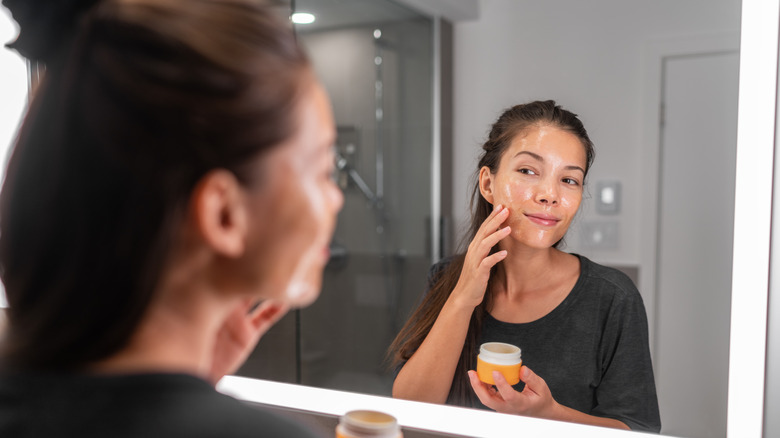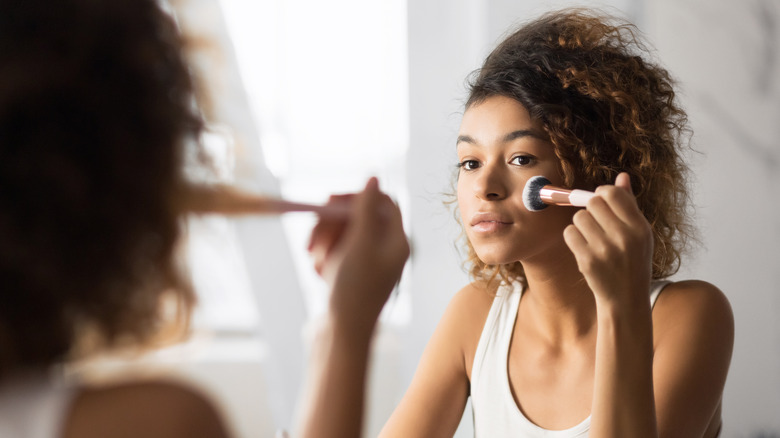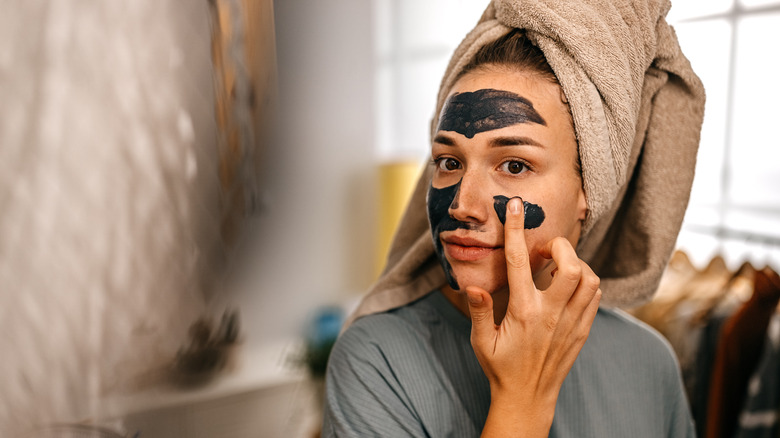8 Ways To Actually Care For Your Oily Skin This Summer (FYI, You Need To Let It Breathe)
We may receive a commission on purchases made from links.
Summer weather can be tough for those with oily skin, as the heat and humidity can make you appear too slick and shiny. While we love a little glow, this kind of summertime shimmer can be excessive. The reason for this is thanks to two types of sweat glands that work together to keep your body cool. "Eccrine or 'regular' sweat glands produce watery sweat, while sebaceous sweat glands secrete an oily product that slows the evaporation of regular sweat, extending the 'air-conditioning' effect," board-certified doctor Tanuj Nakra explained to The Zoe Report. However, the oil tends to sit on top of the sweat, creating that appearance of extra shine.
The natural instinct is to use harsh products to reduce oil, but this only urges the skin to increase oil production since it's been stripped of all of its natural oil. Fortunately, there are ways to manage your oily skin even on the hottest and most humid of days. To combat shine in the summer, approach your skin with a "less is more" mentality. Oily skin needs to breathe in the summer.
Cleanse with oil
While the temptation might be to go strong with a cleanser in the summertime, try to resist. You don't want to strip your skin of its natural oils so the gentler the products, the better. Even though it may seem counterintuitive when dealing with oily skin, you may want to consider double cleansing – starting with an oil cleanse, and following up with a gentle face wash.
A good cleanser is imperative all year round, but especially in the summer, when you want to clean your skin from the sweat, sunscreen, and makeup from the day. Not only will a good oil cleanse remove dirt and debris, but it's also been proven to be the best cleanser to fully remove sunscreen. A fan favorite is the Erborian Black Cleansing Oil because it's a gentle product that contains active charcoal powder that draws out impurities while keeping skin supple. Another favorite is Kiehl's Midnight Recovery Botanical Cleansing Oil. This will help your skin feel refreshed and cleansed without getting into hydration overdrive. If you're doing the double cleanse method, you can follow up with Cetaphil Daily Facial Cleanser, which will remove any excess oil while still maintaining hydration. Most importantly, don't fall into the temptation of washing your face too frequently. "Do not increase the frequency of facial skin washing," Dr. Melanie Palm told Forbes. This will dry out your face and counteract the efforts in oil reduction.
Don't stop moisturizing
When it's especially hot and humid, moisturizing after cleansing may seem unnecessary, but even if you're feeling extra oily, don't skip this vital step. "It is a myth that increased sebaceous gland production means that moisturizers can take a summer break," Dr. Tanuj Nakra told The Zoe Report. "Moisturizing is just as important in summer as any other season." For those with oilier skin types, Dr. Nakra recommends a moisturizer with hyaluronic acid, which acts to lock moisture in the skin without making it greasy. On top of this, you may want to consider a face oil at night, so that the sebaceous glands don't feel the need to work overtime.
However, if a facial oil sounds like one notch too much, just stick to oil-free moisturizers both morning and night after you cleanse. Neutrogena Hydro Boost is a fan favorite in this category, as is the Differin Oil Absorbing Moisturizer.
Exfoliation is great for oily skin
Exfoliation is another way to care for oily skin during the summer months. It helps slough off dead skin cells, which is extra important when dealing with oily skin. This reduces the likelihood of dead skin and dirt clogging pores, thus leading to breakouts. "If we don't remove the dead cells, our skin can appear dull and, in time, our pores can become blocked, which often leads to a breakout of acne or oily skin," dermatologist Dr. Rachael Burns told Byrdie.
A salicylic acid base works well to exfoliate the skin. Consider something like La Roche-Posay Effaclar Clarifying Solution, which contains salicylic acid and glycolic acid to rid the skin of dead skin cells. For oily skin, exfoliating three times a week is a good rule of thumb, board-certified dermatologist Dr. Lian A. Mack told Rose Inc: "Chemical exfoliators include ingredients like glycolic and salicylic acids, alpha and beta-hydroxy acids, mandelic acid, lactic acid, and polyhydroxy acid. These chemicals dissolve the glue holding the skin cells together, resulting in sloughing."
Ease up on your primer
When working with oily skin, part of caring for it includes reducing the use of certain products, even ones that are pitched as helpful for oily skin. For this reason, it's actually better for oily skin to skip a mattifying primer. Josee Leduc, makeup artist and founder of skincare brand Odièle, warned The Zoe Report about the negative effects of mattifying primers. "Be aware of 'oil-combatting' and 'matte' products," Leduc said. "Whilst their results are almost instant, the [long-term] negatives outweigh the positives."
Mattifying primers are supposed to reduce oil production, but as Leduc explained, skin overcompensates by producing more oil. Reddit user velvetpixie mentioned this on the Makeup Addiction panel. "[A]ll makeup primers I've tried make me oilier and shinier than if I had just applied my foundation straight onto bare, moisturized skin," they explained, listing the several mattifying primers they've already tried. Experts and consumers alike seem to agree that directly fighting oil production with mattifying products only increases the problem.
Let your sunscreen help
While you can nix your mattifying primer, sunscreen is non-negotiable. The good news is that there are several options that work well with oily skin. Korean sunscreen is the way to go, since the technology is much more modern than sunscreen made in the U.S., meaning that it won't leave your skin feeling greasy or sticky. Plus, the protection from UVA and UVB rays is much more complete.
There are fan favorites when it comes to Korean sunscreen for oily skin. The MISSHA All-Around Safe Block Soft Finish Sun Milk SPF 50+/PA+++ is a hit. Thanks to its milky finish, it absorbs easily into the skin without leaving a greasy residue. Plus, it refreshes the skin, something additionally appealing to those with oily skin. Another brilliant option is Etude's Sunprise Airy Finish SPF 50+/PA++++. Its aloe vera base is cooling and refreshing on the skin and since it's water-based, it's helpful for oily, acne-prone skin.
Go light on your makeup
Oily skin wants the chance to breathe during the summer months, so lighten up on your makeup. As your skin sweats more and as sebaceous glands produce more oil, a heavy foundation, "can make our skin more prone to breakouts and other skin irritations," Josee Leduc told The Zoe Report. "For summer, I suggest you let your skin breathe and let go of your foundation," Leduc added.
If you do still want some makeup, Leduc suggested going for cream-based products rather than powder ones. While you may assume that powder is the way to go for oily skin, in fact, powder foundation, blushes, and bronzers can "patch up in these climates," Leduc warns. For touch-ups throughout the day, lean on blotting sheets to soak up the shine rather than using a mattifying powder. We want to take away the excess oil, not mask it with more product.
Incorporate face masks into your summer routine
Another crucial way to take care of oily skin during the summer is through face masks. We love the ritualistic element of face masks too, because they tend to prompt an evening of self-care. For oily skin, opt for masks with charcoal and clay as well as avocado oil. The Aztec Secret Indian Healing Clay mask is a cult favorite for good reason; it's affordable and is made solely of natural calcium bentonite clay, while tending to work best when mixed with apple cider vinegar. The simple combination works well on oily, acne-prone skin.
Hydrating masks are also a good option, to reduce the risk of stripping the skin of too much of its natural moisture. The EPARA Intense Hydrating Mask is a popular option because it's designed to balance sebum production. This, of course, is exactly what you want during those hot summer months.
How your diet impacts oily skin
Caring for oily skin during the summer isn't just about topical products. What you eat — and don't eat — also impacts this situation. Dermatologist Patricia Boland told Byrdie that it's best to stay away from salty, processed foods. "Consuming excess salt can cause dehydration, water retention, swelling, and eye bags," Dr. Boland explained. "It can also lead to an increase in oil levels as the skin tries to combat the dehydration caused by salt." Red meat can cause inflammation in the skin, as does fried food, and too much sugar and refined carbs prompt the production of excess oil. Additionally, alcohol dehydrates the skin, which can lead to excess oil.
Keeping oily skin in mind, Stylecraze reports that the best foods to eat in the summer are fish high in omega-3 fatty acids, cucumbers, avocados, bananas, spinach, brown rice, and whole grain products. Tackle hydration with non-alcoholic, non-sugary beverages. Sparkling water is a great way to stay refreshed and hydrated, and your skin will thank you.








